GOVERNMENT 14 - Capital Punishment in the Law
- This is not a study asking whether death penalty is right (what should capital punishment be?).
- This is a study trying to understand why God declares certain crimes as the most destructive, most highly to be punished and most important to consistently judge.
Categories of crimes requiring capital punishment
- Crimes deserving death are in 6 basic categories:
- 1 promotion of idolatry leaders, family member, community
- 2 premeditated destruction of life murder, kidnapping, malicious witness
- 3 willful destruction of another family adultery, rape
- 4 destructive sexual practices incest, rape, perversions
- 5 rejection of specific authorities religious, judiciary, parents
- These were practiced by the seven Canaanite nations that Israel destroys. These nations were no longer ‘nations with bad people’, but they had become nations that institutionalized life-destroying values, values which permeated every person, family and institution.
- Example: Sodom and Gomorrah: not a few bad men come to rape Lot’s guests, but “the men of the city, the men of Sodom, both young and old, all the people, to the last man” (Gen 19:4) > God judges wholesale by complete destruction after evacuating the sort-of-righteous.
1 Idolatry by the chosen nation
- These laws are addressed to Israelites. The first issue emphasized for death penalty is using the religious platform as a means of promoting institutionalized apostasy and violence.
- God destroyed the seven nations from before Israel for acts like this, so if Israel, the chosen nation, commits the same crimes it deserves the death penalty, that is: if persistently continued, this will lead to national destruction, Lev 18:28).
- Promotion of idolatry by whom?
- A Leaders Deu 13:1-5, Deu 18:17-20 (prophets), Num 25:1-5 (chiefs, people)
- B Family members, close friends: Deu 13:6-11
- C Community Deu 13:12-16 instructions as devoted to destruction (Joshua)
- D anyone (also foreigner) who sacrifices children to Molech: Lev 20:1-5
- Due process in case of idolatry described in Deu 17:2-5: “idolatry committed by any Israelite … hear of it … make a thorough inquiry … if charged proved true: bring out to gate and stone … on the evidence of two or three witnesses the death sentence shall be executed … the hands of the witnesses shall be the first raised against the person to execute the death penalty and afterward the hands of all the people”.
- Landa Cope: “These are not trials for believing in different gods. These are trials for religiously promoting human sacrifice and practices that will lead to violence and destruction of human life (not sure about basis for this).
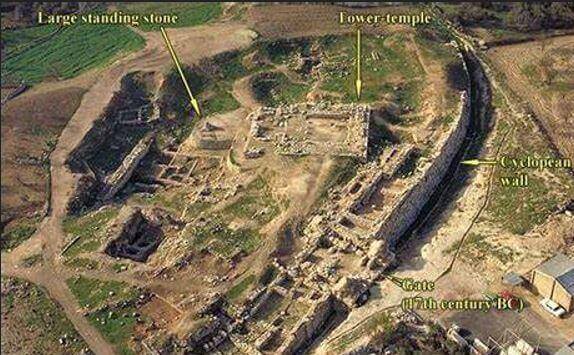

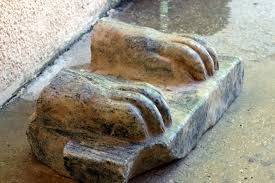
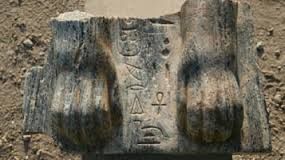
- At excavations in Israel’s Tel Hazor, the strong northern city Joshua destroys (Jos 11:10-11) evidence of willful destruction of idols was found (statues with heads, hands, feet slashed off). God commands Israel to destroy objects of idolatry in Deu 7:5.
2A Premeditated destruction of life (murder)
- Exo 20:13, Deu 5:17 “You shall not murder!” (6th commandment)
- Exo 21:12 “Whoever strikes a person mortally shall be put to death.”
- Lev 24:17 “Anyone who kills a human being shall be put to death.”
- Num 35:16 “But anyone who strikes another with and iron object, and death ensues, is a murderer, the murderer shall be put to death.”
- Deu 19:11-13 “But is someone at enmity with another lies in wait and attacks and takes the life of that person, and flees into one of these cities, 12 then the elders of the killer’s city shall send to have the culprit taken form there and handed over to the avenger of blood to be put to death. 13 Show no pity; you shall purge the ult of innocent blood from Israel, so that it may go well with you.”
- Exo 27:29 “No person devoted to destruction may be ransomed; they are to be put to death.”
- Num 35:31 “Moreover you shall accept no ransom for the life of a murderer who is subject to the death penalty; a murderer must be put to death.”
- Premeditated, intentional, motivated killing (=murder) requires capital punishment with no ransom option. Life is sacred. Murder requires punishment, otherwise life becomes cheap.
2B Negligent destruction of life
- Categories of negligent destruction of life in Exodus are:
- 1 fight
- 2 beating of male or female slave
- 3 excessive force in self- or property protection
- 4 bull goring someone
- Exo 22:2-3 “If a thief is found breaking in, and is beaten to death, no blood guilt is incurred; 3 but if it happens after sunrise, blood guilt is incurred.”
- The property owner has a right to defend his possessions and in the darkness a death may well have been unintended / accidental.
- But during daytime restraint in required of the owner since a human life is more valuable than possessions. A killing of a thief in daylight is treated as ‘mob beating’ or vigilante law, prone to escalate into more violence and prolonged feuds.
- Exo 21:20 “When a slave owner strikes a male of female slave with a rod and the slave dies immediately, the owner shall be punished. 21 But if the slave survives a day or two, there is no punishment; for the slave is the owner’s property.”
- The life of a slave is as sacred as the life of any other human being > death penalty. No verse mentioning that ransom can be done instead of a death sentence.
- Ex 21:22-23 “When people who are fighting injure a pregnant woman so that there is a miscarriage, and yet no further harm follows, the one responsible shall be fined what the woman’s husband demands, paying as much as the judges determine. 23 If any harm follows, then you shall give life for life …”
- as with the slave, an unborn child’s life is sacred. The sovereignty of the individual’s life and the contribution of this life to the community has been lost.
- This is a death penalty crime. No ransom is allowed.
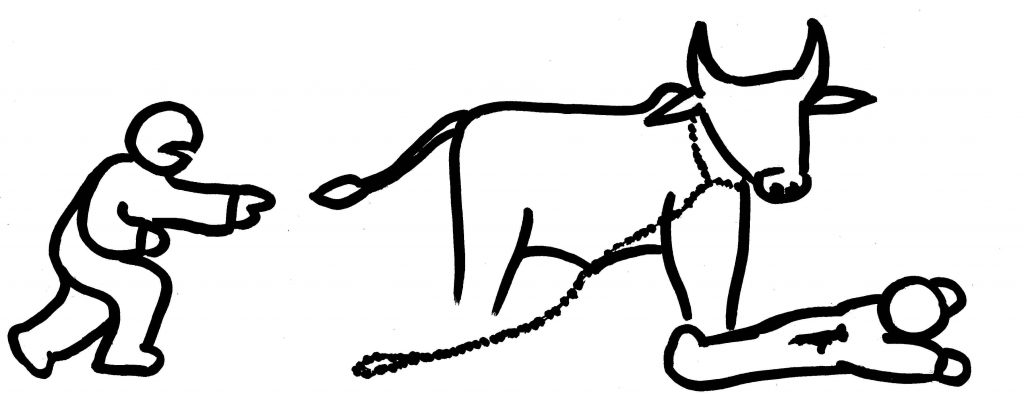
- Exo 21:28 “If a bull gores a man or woman to death, the bull is to be stoned to death, and its meat must not be eaten. But the owner of the bull will not be held responsible. 29 If, however, the bull has had the habit of goring and the owner has been warned but has not kept it penned up and it kills a man or woman, the bull is to be stoned and its owner also is to be put to death. 30 However, if payment is demanded, the owner may redeem his life b the payment of whatever is demanded. 31 his law also applies if the bull gores a son or daughter. 32 If the bull gores a male of female slave, the owner must pay thirty shekels of silver to the master of the slave, and the bull is to be stoned to death.”
- Deu 22:8 “When you build a new house, you shall make a parapet for your roof; otherwise you might have blood guilt on your house, if anyone should fall from it.”
- If no prior knowledge > treated as accident > bull killed (punishment, prevention of future accidents), not eaten (a human life has been lost, no one should profit).
- If prior knowledge but no restraint by owner > treated as negligent killing > death penalty. If the family accepts ransom instead (any amount), that is permissible.
- Preventative, risk reducing measures are required for residents and workers.
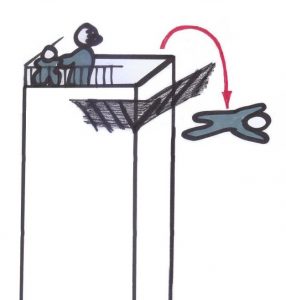
2C Other forms of destruction of life: Kidnapping
- Deu 24:7 “If someone is caught kidnapping another Israelite, enslaving or selling him, then that kidnapper shall die. So you shall purge the evil from your midst.”
- Exo 21:16 “Whoever kidnaps a person, whether that person has been sold or is still held in possession, shall be put to death.”
- The action of kidnapping might not have resulted in the death of the person, yet death penalty is imposed.
- God affirms that ‘life’ is more than surviving. Live is freedom and self-determination to make choices and live out the consequences of that calling.
2D Other forms of destruction of life: Malicious witness
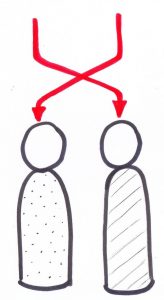
- Deu 19:16-21 “If a malicious witness comes forward to accuse someone of wrongdoing, 17 then … 18 … thorough inquiry. If the witness is a false witness, having testified falsely against another, 19 then you shall do to the false witness just as the false witness had meant to do to the other. So you shall purge the evil from your midst. 20 The rest shall hear and be afraid and a crime such as this shall never again be committed among you. 21 Show not pity: life for life, eye for eye …”
- False implication, especially in a crime requiring death penalty, is the same as murder. The only difference is that the weapon to kill is the judicial system.
- Lev 5:1 “When any of you sin in that you have heard a public adjuration to testify and – though ale to testify as one who has seen or learned of the matter – do not speak up, you are subject to punishment.”
- Obligation of the community to play their part in ensuring justice by speaking up. If is not enough for the judicial system to be committed to truth.
- If the individual citizen is not also actively engaged in deterrence of crime it will be nearly impossible to prove any crime. To allow crimes to be unpunished and thus to further an atmosphere of fear and silence where murder can be done with impunity is a crime in itself. Known killers roam freely and innocent people fear for their lives.
- To know and not speak up, whether that stalls the judiciary process for lack of evidence or whether my silence lets the guilt rest on somebody innocent – is a crime.
- Deu 17:7 “The hands of the witnesses must be the first in putting that person to death, and then the hands of all the people. You must purge the evil from among you.”
3 Destroying of other family by adultery
- Exo 20:14, Lev 18:20, 20:10, Deu 5:18, 22:22: Destroying a family by adultery
- Deu 22:23-27: Rape of engaged or married woman
4 Destructive Sexual practices
- Only sexual relations allowed are with own legally married spouse.
- Sexual relations with blood relatives or married-into-family relatives are forbidden:
- Step mother Lev 18:8, 18:17, 20:11, Deu 27:20
- granddaughter Lev 18:10
- sister, stepsister Lev 18:9, 18:11, 20:17, 20:19, Deu 27:20, 27:22
- uncle’s wife Lev 18:12-14, 20:20
- daughter-in-law Lev 18:15, 20:12
- sister-in-law Lev 15:24, 15:33, 18:16, 20:21
- woman and daughter Lev 18:17, 20:14
- woman during period Lev 18:19, 20:18
- man with man Lev 18:20, 20:13
- with animal Lev 18:23, 20:15-16, Exo 22:19
- daughter > prostitute Lev 19:29
- married woman Lev 18:20, 19:20, 20:10
- rape > marry, no divorce Deu 22:28, Ex0 22:16
- rape of married woman Deu 22:20-27
- Murder anywhere is motivated by the same few issues: property, vendetta, crimes of passion, crime of jealousy. Investigation of murder cases look for: monetary gain, history of aggravation, love interests, sexual conduct.
- When slighted in matters of the heart humans are prone to kill. Most crimes of passion revolve around partners, parents, children.
- Violations of love and trust often lead to physical violence.
- Num 5:11-31, Deu 22:13-21: God takes simmering jealousy and accused infidelities very seriously. Unless there is judicious attempts at resolution of conflicts > increase of domestic violence >> increase of community violence.
- Example: David’s family, most trespass lingers completely unaddressed. David commits adultery with Bathsheba and murders of her husband. Amnon rapes his step-sister Tamar. Tamar’s brother Absalom murders Amnon and rebels against his father David. Absalom sleeps with David’s concubines in the public eye for revenge.
- No animals? Only a person in the image of God can be partner of a person in the image of God. Devastating diseases have been transferred to humans in this way
- No adultery? > cumulative tragedy of venereal disease, incest, abuse of children, rape. These are not only damaged minds but lost lives.
- There is no such thing as ‘sex without consequences’. The belief in ‘sex without consequences’ has possibly killed more humans than all wars combined. From God’s perspective this is a form of violence.
- The laws have a clear bias in addressing men as the main perpetrators and women and children as the ones more likely to be abused.
6 Rejection of Authority
- Though the Scripture emphasizes the freedom and importance of the individual, there are death penalties for rejection of certain institutional authorities.
- We should not conclude from this that these authorities need to be obeyed absolutely, making them gods in our life, for that would make nonsense of all the emphasis on authority of the individual (and limits thereof).
- Back to the dilemma of human freedom: Freedom unrestrained will lead, in a fallen world, to some form of anarchy, the greatest source of violence and loss of human life. Freedom overly restrained by institutional authority will lead to tyranny, the second greatest source of violence and loss of human life.
- The best we can achieve in a fallen world is: tension of powers, system of checks and balances between competing authorities and rights … which is ‘proper order’.
- Individuals can go too far in their assertion of their freedom. When they do the community must take action:
- What are the institutions that must be respected with threat of death sentence?
- 1 priesthood
- 2 judiciary
- 3 parents
Priesthood and Levites
- Num 1:51, 3:10, 3:38, 18:5: Only priests and Levites are allowed to perform services at the tabernacle. Other ones approaching are to be put to death.
- Ex 31:14-15: death penalty for work on sabbath (on the tabernacle or in general?)
- Lev 24:15: death penalty for cursing or blaspheming God
- Exo 22:18, Lev 20:27, Deu 18:10: death penalty for mediums, diviners, wizards, witches, diviners … though consumers were not given punishment.
- Why? To allow powers of the unseen world to access our daily lives means to totally blur and undermine human choice, authority and responsibility.
- Cultures with mediums, spiritists, wizards exhibit just how destructive this is > regular violence, no justice, death.
Judiciary
- Deu 1:18: System of appeals, the highest possible appeal: to priesthood (Deu 17:9)
- Deu 17:10-12: “You must act according to the decisions they give you at the place the LORD will choose. Be careful to do everything they instruct you to do 12 Anyone who shows contempt for the judge or for the priest who stands ministering there to the LORD your God is to be put to death …”
- If the last instance in an appeal process is not binding > authority and effectiveness of the entire system undermined > slide towards lawlessness & self-justice
Parents
- Exo 21:17, Lev 20:9 “All who curse father and mother shall be put to death …”
- Exo 21:15 “Whoever strikes father or mothers shall be put to death.”
- Deu 21:18-21: Handing over a rebellious teenager to the elders of city for execution
- These passages have mostly been understood to be strong emotive exhortations and warnings rather than strictly applied legal pronouncements.
- Modern terminology: Sociopath that is dangerous to society. Parents are obliged to raise alarm for the community and take initial legal action to curb the child’s behavior.